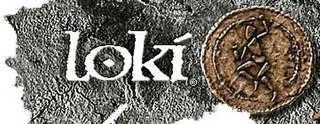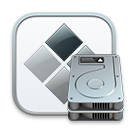
Loki Software, Inc. was an American video game developer based in Tustin, California, that ported several video games from Microsoft Windows to Linux. It took its name from the Norse deity Loki. Although successful in its goal of bringing games to the Linux platform, the company folded in January 2002 after filing for bankruptcy.

A/UX is a Unix-based operating system from Apple Computer for Macintosh computers, integrated with System 7's graphical interface and application compatibility. It is Apple's first official Unix-based operating system, launched in 1988 and discontinued in 1995 with version 3.1.1. A/UX requires select 68k-based Macintosh models with an FPU and a paged memory management unit (PMMU), including the Macintosh II, SE/30, Quadra, and Centris series.
MkLinux is an open-source software computer operating system begun by the Open Software Foundation Research Institute and Apple Computer in February 1996, to port Linux to the PowerPC platform, and Macintosh computers. The name refers to the Linux kernel being adapted to run as a server hosted on the Mach microkernel, version 3.0.

Civilization: Call to Power is a turn-based strategy game developed by Activision for Microsoft Windows as an attempt to capitalize on the success of the Civilization computer games by Sid Meier. It was ported to Linux by Loki Software, as well as BeOS by Wildcard Design, becoming one of the very few commercial games for that operating system.

Basilisk II is an emulator which emulates Apple Macintosh computers based on the Motorola 68000 series. The software is cross-platform and can be used on a variety of operating systems.

Strategic Conquest is a turn-based strategy game based on the wargame Empire. It was written by Peter Merrill for the Apple Macintosh and released in 1984 by PBI Software, and later ported to the Apple II in 1986. Delta Tao Software took over distribution for later Classic Mac OS releases. It is sometimes shortened to Stratcon.
Linux Game Publishing was a software company based in Nottingham in England. It ported, published and sold video games running on Linux operating systems. As well as porting games, LGP also sponsored the development of Grapple, a free software network library for games. As well as acting as a Linux game porter in of themselves, they also functioned as a publisher for other Linux game developers and porters. The company was dissolved on 3 May 2011.

Boot Camp Assistant is a multi boot utility included with Apple Inc.'s macOS that assists users in installing Microsoft Windows operating systems on Intel-based Macintosh computers. The utility guides users through non-destructive disk partitioning of their hard disk drive or solid-state drive and installation of Windows device drivers for the Apple hardware. The utility also installs a Windows Control Panel applet for selecting the default boot operating system.
Mac gaming refers to the use of video games on Macintosh personal computers. In the 1990s, Apple computers did not attract the same level of video game development as Microsoft Windows computers due to the high popularity of Microsoft Windows and, for 3D gaming, Microsoft's DirectX technology. In recent years, the introduction of Mac OS X and support for Intel processors has eased porting of many games, including 3D games through use of OpenGL and more recently Apple's own Metal API. Virtualization technology and Boot Camp also permit the use of Windows and its games on Macintosh computers. Today, a growing number of popular games run natively on macOS, though as of early 2019, a majority still require the use of Microsoft Windows.
Linux-based operating systems can be used for playing video games. Because many games are not natively supported for the Linux kernel, various software has been made to run Windows games, such as Wine, Cedega, and Proton, and managers such as Lutris and PlayOnLinux. The Linux gaming community has a presence on the internet with users who attempt to run games that are not officially supported on Linux.

Ryan C. Gordon is a computer programmer and former Loki Software employee responsible for icculus.org, which hosts many Loki Software projects as well as others. Gordon's site hosts projects with the code from such commercial games as Duke Nukem 3D, Shadow Warrior, Quake III Arena and other free and open source projects for multiple platforms.
Delta Tao Software is a small software developer and publisher focusing on games for Macintosh, though some of its more popular products have been ported to Windows, Linux, and other platforms.
Two major families of Mac operating systems were developed by Apple Inc.
Telegames, Inc. is an American video game company based in Mabank, Texas, with a sister operation based in England.

Timothée Besset is a French software programmer, best known for supporting Linux, as well as some Macintosh, ports of id Software's products. He was involved with the game ports of various id properties through the 2000s, starting with Quake III Arena. Since the development of Doom 3 he was also in charge of the multiplayer network code and various aspects of game coding for id, a role which had him heavily involved in the development of their online game QuakeLive. Since departing id in January 2012 he has worked as a software contractor, including for Valve Software.
Apple File System (APFS) is a proprietary file system developed and deployed by Apple Inc. for macOS Sierra (10.12.4) and later, iOS 10.3, tvOS 10.2, watchOS 3.2, and all versions of iPadOS. It aims to fix core problems of HFS+, APFS's predecessor on these operating systems. APFS is optimized for solid-state drive storage and supports encryption, snapshots, and increased data integrity, among other capabilities.
Comparison of user features of operating systems refers to a comparison of the general user features of major operating systems in a narrative format. It does not encompass a full exhaustive comparison or description of all technical details of all operating systems. It is a comparison of basic roles and the most prominent features. It also includes the most important features of the operating system's origins, historical development, and role.








